#catharsis meta
Note
Can you explain more about the usages of "catharsis"? Wiki tells me "In dramaturgy, the term usually refers to arousing negative emotion in an audience, which then expels it, making them feel happier." which seems similar to my experience of fannish usage?
In fannish usage, it seems almost inevitably linked to the idea of a relief for the characters, or even comfort, or "good thing after bad". Promising catharsis in the next chapter; saying that you found a specific storyline cathartic (which tbh generally sounds like a healing thing to me. "it was so cathartic when character A came out to their grandma and Granny was supportive!"); "it was just bad things happening all the way down! where's the catharsis!"
That's not always definitionally antithetical to cartharsis in the dramaturgy sense, but it's not related to the concept (at least not the way it was taught to me back then).
Otoh catharsis is a... controversial concept even among classical authors (I use the term loosely), with a number of authors making fun of the concept or arguing that there's no real way to make a difference between the "expelling of negative emotions" of catharsis and the dreaded "emotions happening".
Simplifying horribly (it has been a while), in my experience the usage of catharsis in dramaturgy tended to occur more in cases of "terrible things happen to the characters! the audience feels better for witnessing these terrible things happening to fictional people and now will go in their life free of the negative urges." (I think mostly a XVIIIe century usage, but in practice that's when we pointed to catharsis happening. Even when talking about ancient plays we didn't mention catharsis at other points that when bad things happened/had been happening though. /again I'm simplifying)
Keep in mind I am not a classicist or an academic by any means and am going off of memories of literature courses that are roughly two decades old, so if you want more actually good explanations instead of "idk it's not used in the same moments which give the word completely different vibes" you'll have to ask people who actually really know their stuff or read up on theory. 😔
#catharsis meta#the connotations ARE wildly different given the moments the word is used in fandom though!
6 notes
·
View notes
Text
anyone else ever think about how at the end of double life, pearl was fully ready and willing to kill scott. had her bow drawn and ready to shoot. but then when he lit the tnt under himself she screamed out in concern for him
#she wanted a climatic fight. she wanted catharsis#and scott denied her that in his final moments#scottpearl meta#girl why you so towers#boy why you so control issues
143 notes
·
View notes
Text
the tragedy of fukuzawa and ranpo's canon relationship is that i genuinely think that ranpo believes he loves fukuzawa more than fukuzawa loves him.
that's why he's so cranky when fukuzawa wants to find atsushi, even though it's illogical and atsushi is a liability. it's only fukuzawa saying that ranpo's reward will be his praise (read: appreciation) that makes him act.
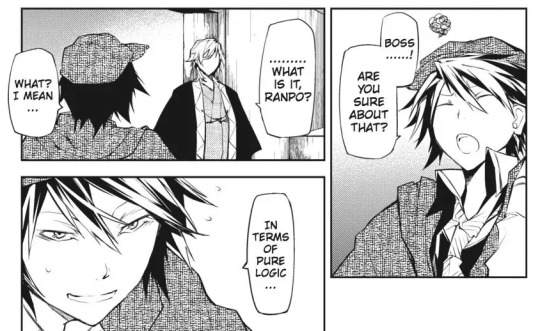

it's why ranpo pictures fukuzawa like THIS when he thinks of his complicated relationship with his friends--that they need him, but as skill users, will always be better than him--during his confrontation with mushi.
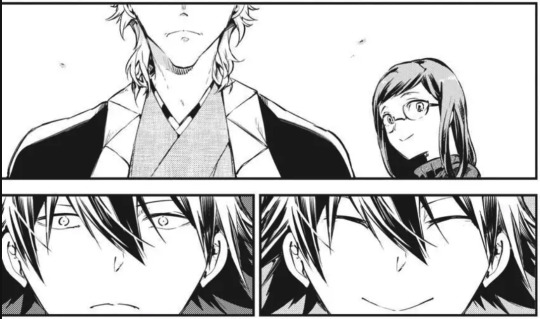
note that this is right after fukuzawa tried to sacrifice himself for the greater good during the cannibalism arc, and that he's currently punishing ranpo for going against orders and trying to save him. (also of note is the fact that ranpo thinks that fukuzawa will be angry with him for trying to get kunikida out of jail.)
it's no coincidence that during this same confrontation, one where mushi is forced to admit that he did the unspeakable for a loved one, ranpo also admits that he would also do terrible things for the sake of his loved ones.
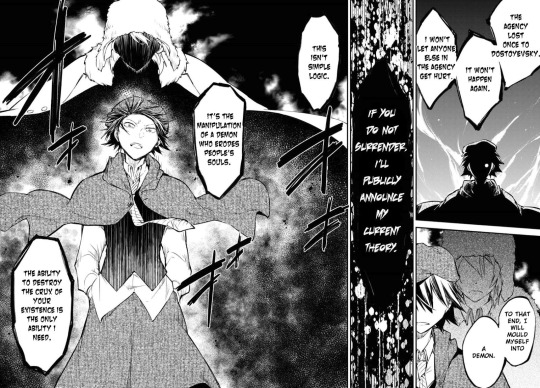
it's part of why he's so furious that fukuzawa won't listen to him at the start of the hunting dogs arc, which happens immediately after the above.
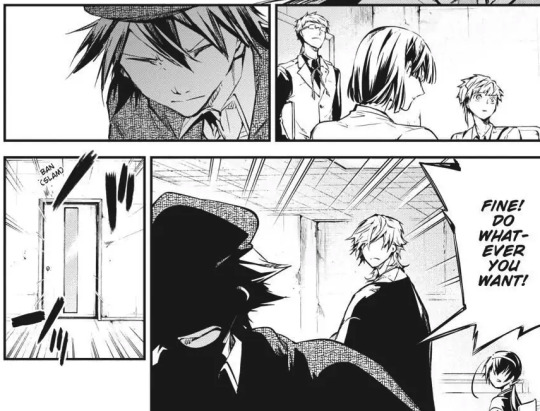
it's why he's so jealous of fukuchi, to the point where fukuchi can get ranpo to act in a way that atsushi has never seen before. fukuchi's taunting has ranpo literally trembling with rage during this scene in the anime.
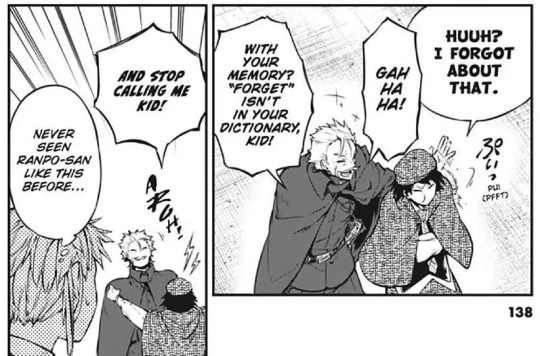
AND! STILL! after all of this--after fukuzawa repeatedly puts his desire for justice above his love and respect for ranpo, after ranpo's dealt with years of fukuzawa sticking up for fukuchi--someone ranpo REALLY doesn't like for both obvious and less obvious reasons--he still trusts fukuzawa and lets fukuzawa's desires guide him.
even when he knows fukuzawa is wrong.
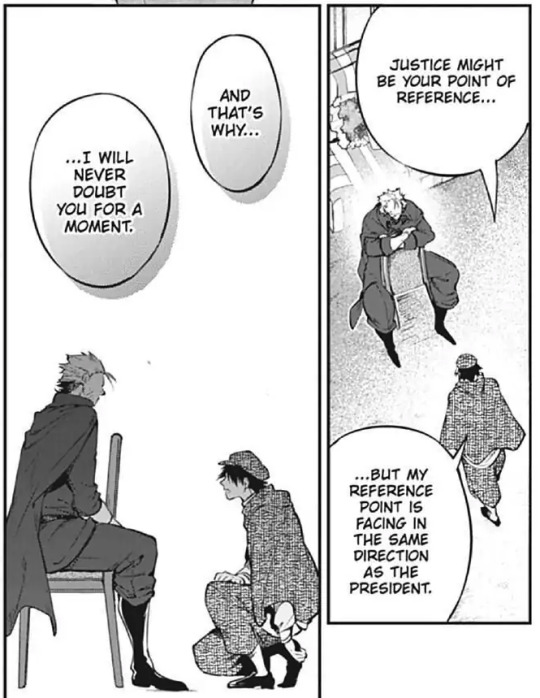
how couldn't this shake ranpo's faith that he matters as much to fukuzawa as fukuzawa means to him? that fukuzawa's desire for justice and upholding the greater good--his need to forever atone for his past--will always mean more than his relationship with ranpo?
that maybe, one day, fukuzawa won't choose him in a way that takes him out of ranpo's life for good?
#hi! hello! i made myself sad!#please be sad with me#ranpo edogawa#fukuzawa yukichi#bsd meta#fukuran#<- though this is definitely more about their platonic sitch in the canon#ranpo#fukufuku#fukuzawa#<- organizational tags#vita.txt#not me hoping that fukuzawa will be denied the catharsis of self-sacrifice!
523 notes
·
View notes
Text
About Love As The Catalyst For Change
Okay, so while I was going through all the panels for March Mania, I also stumbled over these ones again:
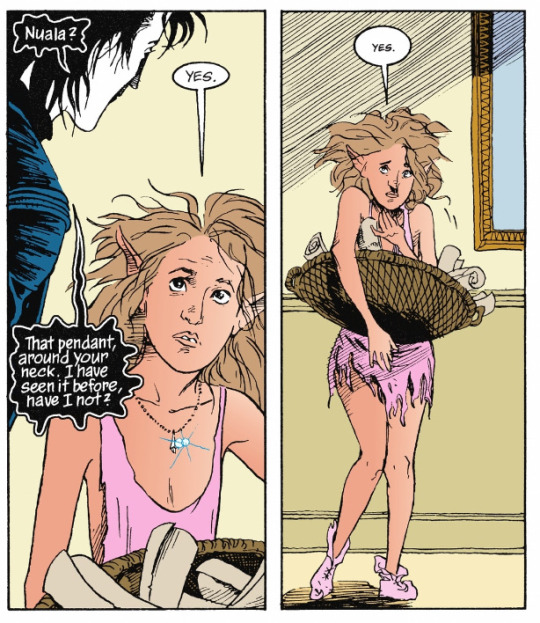
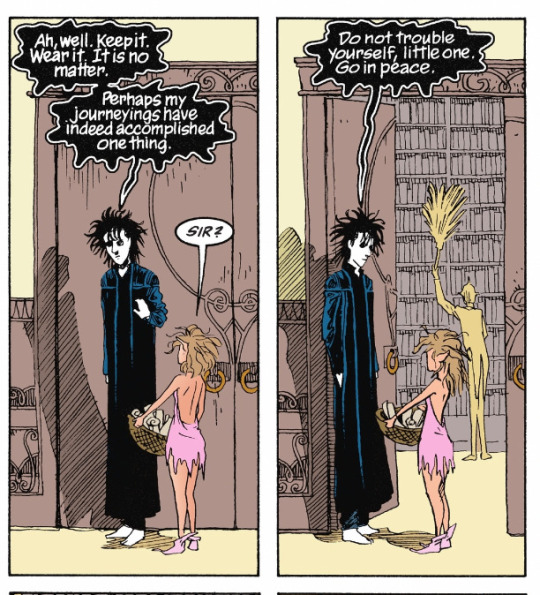
And although I’ve read it all a million times and had all these feelings before, I just need to blurt them out:
Love Is What Changes Him
It’s such a central message of The Sandman, but I feel it often gets lost in a million other things. And they’re all important, but so is this one.
Because yes, Dream went with Delirium and found Destruction (and Despair found him btw), and his Destiny was Death. And that whole Desire thing… ‘nuff said. BUT… (major spoilers ahead)
Those panels above are basically the turning point in a nutshell. No, well, the turning point is actually the moment he kisses (and then kills) Orpheus, but those panels are the essence:
He set out with Delirium in hopes to find Thessaly (the pendant Nuala wears here used to be hers, and she gave it to her when she left the Dreaming and him. And I can’t even begin to tell you how I feel about him letting Nuala keep a gift of his ex, who betrays him later by protecting the woman he hurt, and then making it the item that holds the power with which Nuala can call in her boon. One could spin that very far in all sorts of different directions).
But when he comes back after killing Orpheus, it doesn’t really matter anymore. Thessaly was the usual romanticised dream that could never be real. But he finally did find love. For his son. The unconditional kind. The one that doesn’t need anything in return because it just is. And he was loved back, if for a brief moment. But it was real, not a dream. And that love stays real (that’s why it initiates the turn, 3rd act and all that).
I’m reminded again of the words of Frank McConnell in his intro to The Kindly Ones:
“And with [killing Orpheus], Dream has entered time, choice, guilt and regret—has entered the sphere of the human.”
(Side note at this point: With all of this in mind, read Dream Hunters [again], and look at all THREE main characters—that includes the onmyōji, not just the monk and the fox.)
And it would be so easy to say, “Well, love killed him then, what’s the fucking point?” Not just the love for his son, but also the love of a maiden who called in her boon (Nuala), the love of a mother for her child (Lyta), the love of a crone for no one but herself (Thessaly).
But we all know that “change or die” was never an “either or”, because it’s an “and both”. And it’s ultimately love, in all its shapes and forms, four times over, that changed him (while it was also part of the death knell, but that’s a complicated one. In any case, it also led to change: To be(come) a new, better, kinder Dream).
Yes, call me romantic or hopeless (although I think that’s the wrong word in this context, because I feel it’s the opposite), I don’t care.
Because that story is about catharsis. And that means Dream is a vessel for our feelings. And the feelings won’t be the same if we change any of this, for better, for worse. Because truthfully: That story is about me. And you. And you.
About allowing love, of whatever kind (this is very clearly not just about romantic love), to change us. And that ultimately means letting go (of control). Just like he did.
Bleurgh, I’m crying. Catharsis 🤣
#the sandman#sandman#neil gaiman#dream of the endless#morpheus#daniel!dream#sandman meta#sort of because it’s a bit feely#and shortish and without a million references#but I’ve brought them several times#in my pinned post#sandman analysis#sandman character analysis#the sandman comics#nuala of the faerie#lyta hall#Thessaly#orpheus sandman#love changes#tragedy#catharsis#sandman spoilers#the sandman spoilers#sandman book club#sandman bookclub
100 notes
·
View notes
Text
being a whump writer is like 'i want savage pain and tenderness and love but with vengeance and anger that makes me want to scream but also maybe hand-holding and-'
613 notes
·
View notes
Text
I love Dundy so so much but Christ, do I hate how fucking calm he seems in that Lawful Mutiny scene...!
Little is riled the fuck up. He's the most animated and impassioned we've perhaps ever seen him, using uncharacteristically expressive language too ("this coven of traitors", "that devil").
Le Vesconte, in sharp contrast, appears cool and collected, to the point of complete detachment and numbness (I say appears because of course he's suffering too). He speaks slowly and plainly, clearly having rehearsed, and chooses his words very very carefully indeed (those too ill to walk will not be left behind, for example, they'll just "stay").
It's almost like he's that arsehole in a disagreement who tries to convince you that they're right just because they're arguing in a calm, 'logical', grammatically-correct manner, and you're wrong just because you're getting passionate and emotional over the subject at hand.
Like, just imagine being Little in that situation!
You've been suppressing your emotions for god knows how long, keeping your anger and resentment simmering just below the surface for as long as you can remember for fear of what will happen if you let those emotions show, fear that it'll just make things worse.
But finally you can suppress no longer, something in you breaks. All that anger and resentment starts to boil over but you find that you were right - letting those emotions show didn't help at all, it made everything worse, just as you feared.
#I don't think I'm articulating this as well as I'd like to#Same old story#But nevertheless I persist#I'm having a lot of feelings about this today and I just need to get them out somehow#It's just the lack of catharsis y'know?#The idea of letting go and ceasing to give a shit and tearing your treacherous coworker a new one#Only it doesn't help#It doesn't make you feel any better and it doesn't change anything#You're just screaming at a brick wall#Oh lord I'm rambling#Ooh boy this got real long and real incoherent real fast.#The Terror#The Terror AMC#Edward Little#Dundy#Henry Le Vesconte#Meta#Observations#Random Observations
76 notes
·
View notes
Text
the thing is that martha and the doctor are an interesting, complicated, eternally evolving in my head dynamic that completely change the game of the narrative, and I am so into them and I will think about them forever and ever
and on the other hand I suspect that at least a certain percent of it comes from my specific reading of the doctor-as-character, and from things that the writing brought up around martha, her position in her family, her history as a medical student, her later decision to join UNIT and Torchwood, her more-than-average complex feelings both during and after being a Companion about what that life meant for her, and what the doctor changed in her life, that I would say were intentional, but weren't brought up in a narrative that was given as much space and time (ha) as other companions, and so she is eternally left in character limbo where I can only ask questions (and read fanfic) and stipulate on what this story was all about for her, and where she went as consequence, and what her feelings are about having been within it, and of course the parts that aged more poorly related to a bunch of white people writing a black woman as a lead character who weren't so well-versed on nuance as one would wish... so it's also the most frustrating dynamic in nu!who, if not all of doctor who, for me, because there is no attempt at giving it a proper end from her side, in the way there has been for so many other companions, including of course lots and lots of classic!who companions
on the third hand you would really want that potential bringing-back to be interesting in a way that interacts with their past dynamic, and fun for freema to do, and you'd worry about the amount of racist backlash that might occur, because nobody was giving martha grace as a character in the first place, would this past complexity that seemed to go over a lot of peoples' heads be something that the show perhaps should be more explicit about, so that there is no ambiguity as to how this series of events affected her and why it's more complicated than with other companions, and how does it both honour her character's inherent strengths, while also not having to make her be so strong All The Damn Time
on the fourth hand... just wanna see her again. and she'd be fire opposite ncuti, you know she would
#martha jones#dw#doctor who#and opposite ncuti she wouldn't be shouldering being the First Lone Main Character Who Is Black#with all the scrutiny and judgement that entailed#tbh give an adventure to fifteen martha and rose noble#i think that would go someways to offering that catharsis to the character + the amount of thematic throughline and narrative/lore#connective tissue between the three of them -- martha from the early days of nu!who -- rose being the next gen and ushering in the new#and fifteen of course is the doctor#also rose has a connection to donna ofc being her daughter. and she has a connection to rose through the name#it seems unjust that martha isn't a part of that celebration of rose's narrative heritage so to speak#fifteen giving martha the biggest hug would heal the biggest frustration i have with this show i swear it would#doctor who meta#the doctor#the tenth doctor#the fifteenth doctor
78 notes
·
View notes
Photo

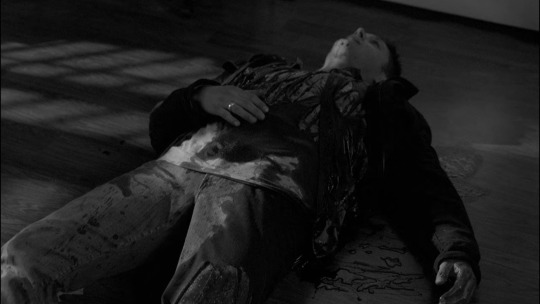


something about the continued(!) motif of Dean’s body as a conduit for violence, from his first traumatic death to his last, but also how the difference between his damnation and salvation is his self-affirmation that “that’s not who I am” (no longer “a good soldier and nothing else, daddy’s blunt little instrument”) — and how he weaponizes the assurance that nothing will hurt him like that again
reclaiming agency over one’s life (and death) — that’s the deal with catharsis
#they healed so many old wounds in just one season. pls corporate overlords let us have more long slow-build catharsis-driven theater <3#the winchesters#supernatural#spn#dean winchester#spnedit#spn meta#spnwin 1.13#3.16#15.20#mine
107 notes
·
View notes
Text
Brennan is right, we do tell stories to make sense of the world. But stories do more than that; they don’t only describe the world, but also shape and change it. Stories propose what may be possible: they are world-making.
Donna Harraway, mother of cyborgs, compares storytelling to a game of cat’s cradle. She finds in games and stories “patterns for participants to enhabit”, “giving and receiving patterns, dropping threads and failing but sometimes finding something that works, something consequential and maybe even beautiful, that wasn’t there before, relaying connections that matter”.
Calamity is a marvel of collaborative storytelling not only because it’s thrilling (which it is) and beautifully told (which it is), but also because of the worlds it proposes (and the worlds it rejects). Let’s talk about the stories that were negated by what actually happened.
It would have been so easy for Calamity to be a morality tale. The players took the assignment to heart: they showed up with characters who reflected all the flaws of the age they were about to leave behind. (I think Aabria and Marisha were especially courageous, because they took on character traits that are often punished in women: social power, ambition, single-minded focus on their vocation, indifference towards social graces.)
Calamity could have so easily become about savouring these people's downfall, and thus indirectly reassuring the viewer: they were prideful, they were full of hubris, and therefore they hurtled towards their downfall and received their due. (Whereas you, gentle viewer would neither slurp up 50% of your city's resources for a secret invention, nor attempt to fuck atone the lord of hells with a 1st level spell. Your flaws will never damn the world.)
It would also have been easy for Calamity to be a tale of futility. It was, after all, conforming to history of Exandria as written: release of Betrayers, centuries of war, eventual Divergence. It could have conformed to the tropes of horror, where every choice, every attempt at exercising agency makes things worse until there are no choices left. It could have said: these people don't know yet, but their fate has been written, all that's left for them is to submit to the inevitable. Their world is doomed; let them give us a lesson in submitting to the inevitable in the most thrilling way possible.
It could also have become a boring recasting of prime deities as villains and betrayers as victims, which would have required us to retcon the actions of the Laughing Hand and Jurrael, and made fools of Caduceus, Pike, and everyone else playing a cleric of a prime deity in Exandria as a setting. (Frankly, I didn't think there was much danger of this face-heel turn, but there were a lot of odd takes on Asmodeus after Ep.2 around these parts.)
Brennan and the cast navigated around all these narrative traps, and instead told a different story. Not of moral failing and punishment, but of grappling with your flaws and striving to do your best anyway. Not of bowing to your sealed fate, but of fighting to exert your agency until your last moment. Not of selfishness, but of care. Of buying your friends, your children, your world, a fighting chance. Of mattering.
Calamity is not a scripted play nor an improv sketch, but a show of a game, and so part of its magic is the story that happens above the table: between the DM and the players, between the players and the characters, between the story and the dice. To have erred on the side of cynicism and despair within the story would have threatened, I think, the rest of the patterns and points of connection. Instead, in its totality, told through all these relationships, Calamity is thrilling, and cathartic, and romantic, and hilarious, and scary, and sincere, and kind.
Calamity, a story about the end of a world, is magical because of the kind of world it describes, and also the world it builds.
I'm so grateful. So, so grateful.
#how long can catharsis last#i've been climbing the walls since friday morning#don't even get me started on Team Dad disintegrating at the table#and sticking it out#and letting us watch#cr spoilers#exu spoilers#exu calamity#brennan lee mulligan#aabria iyengar#marisha ray#cr meta#critical role
736 notes
·
View notes
Text
Ted going back to Kansas is still not my ideal outcome for this show, but I very much do like that he quit Richmond before they won the whole fucking thing. Never quitting, never giving up was such an integral part of Ted’s occasionally toxic positivity and by allowing himself not to stick things out just to stick them out and by doing what he felt he needed to do, irregardless of what ill-advised promises he may have made, he took a huge and important step away from that.
#sometimes putting yourself before others is the lesson we need to learn#and my main issue with ted going back to kansas to be with henry#was that it didn’t feel like any sort of development or catharsis for him#except it was!#so i’d still prefer him at richmond#but narratively this really works for me#apart from maybe how the last shots were framed but that’s minor details#ted lasso#3x12#meta#my stuff
84 notes
·
View notes
Text
thinking about the narrative structure of mp100 again and chewing on the rafters.
just! everything is so tight and so well-constructed and so *necessary*. it knows exactly what its themes are and it manages to build on them iteratively so that every time they appear even though it's said almost the same thing before the new phrasing still feels like being hit with a sledgehammer. the plots can be absurd but they build on each other so cleanly. the parallels are so!!! complex and multifaceted and I find new ones every time I rewatch!! the character arcs are so integrated with each other! the show as a whole is so *cohesive*! I love this narrative!!!
#thinking about how in Confession Arc everyone's confrontations with ???% manage to#a) mirror an earlier confrontation between them while#b) giving the character an insight that resolves their character arc and#c) (this is more complicated i'm gonna make a post about it)#providing the same thing/catharsis/lesson to Mob that he did to them (even if he can't internalize any of them until the end)#you need EVERYTHING that happens in Confession arc to happen in order for Reigen's confession to work#and you need everything else in the show to happen for confession arc to happen#this is like. the longform narrative equivalents of one of those really stupid sonnet sequences#where the first line of every sonnet read in sequence makes another sonnet#i will be picking it apart with a fine-toothed comb for the rest of my life and there will still be more#mp100#mob meta
97 notes
·
View notes
Note
Just casually thinking about Ian noticing that Mickey is stressed so he holds his face and gives him tender kisses until he's calm and relaxed. Or until his entire body melts, whichever comes first.
ohhhh yes i am very (not) casually thinking abt this now
mickey: angy stomping around the house, obviously in need of husband kisses and doting to cure his ailment
ian:

tbh i see ian as a bit emotionally oblivious, but once he realizes mickey is stressed/upset and its not gonna go away on its own, its all hands on deck baby he is pulling mickey into a monster bear hug and refusing to let go until mickey lets all his emotions out and/or talks to him about it
they both have physical touch as a love language so you bet your ass they kiss and hold and sway with each other when they feel the other needs it. i am also continuing to push my "autistic mickey is an emotional sponge" narrative and say that he can feel ians energy shift immediately when it happens. hes like okay ian you may be the emt but this is a case for dr. gallagher-milkovich 🫡 i prescribe you with forehead kisses, couch cuddles, and a rewatch of you favorite chick flick without any complaining💊 (mick breaks his own rule about complaining but in his defense he only complains about it from a critical standpoint, not just because its a chick flick)
#they would love watching mean girls together dont @ me#hashtag give mickey emotional catharsis 2023#asks#anon#anonymous#a.txt#glad other people are still as abnormal about them as i am#gallavich#shameless#gallavich meta
41 notes
·
View notes
Text
maybe part of why michael is so self destructive is that his father always seemed happier when he was crying or in pain, so he's internalized the idea that his own suffering makes other people happy
#like there's probably some level of catharsis in it for him yea#but maybe he thinks. like. subconsciously. that's what everyone else WANTS#michael standing in front of the scooper#terrified but hoping that the immense pain he anticipates will make his little sister smile#william always smiled when he was hurt after all#michael letting himself get hurt and far too close to killed as the night guard#because maybe evan is there. maybe he'll see. maybe it will give him some satisfaction#character meta#kinda#fnaf#michael afton#cw abuse
24 notes
·
View notes
Note
I know this is a serious scene in a serious story but I burst out laughing when I saw her execute Yes Man within 2 seconds of running into him
.

#don't feel bad at all lmao you understood the tone perfectly#it's about the catharsis and relief after the previous issue and yeah it's kind of funny lol#agnes sands#ikroah meta#asks
46 notes
·
View notes
Text
bbc merlin rewrite moment: lancelot arthur gwen version
first of all lancelot doesnt die. second of all we dont do a year timeskip between season 4 and 5, we get into the Grit of gwen going from servant to queen. and gwen is Not dealing with things well. everything sucks. a good chunk of servants no longer treat her as one of their own and the existing nobility isnt exactly Great either. she still has some support but stress is High. and arthur is still doing the magic ban. executions arent as common as they were under uther, but they still happen. it reminds her of her father's execution. but arthur and the council are unmoving when it comes to magic: the council is old and arthur is his father's son at the worst moments.
and what do you know there's lancelot around. lancelot who is sympathetic to magic users, lancelot who cares deeply for gwen lancelot whose loyalty to merlin is unquestionable but whose loyalty to the crown of camelot is...fraying, the longer arthur wears it and nothing changes.
they both start to fall out of love with camelot and with arthur. they find solace in each other's company. they decide to leave together. they try to convince merlin to leave too, but have no luck. they promise to stay in contact as best they can without risking arthur's ire.
arthur learns that following in his father's footsteps means he will only live his father's life. crucially gwen and lancelot still care about arthur, they just Cannot handle staying in camelot and keeping the vows theyve made to king and crown. crucially arthur and merlin eventually meet them again on their secluded farm and has a quiet conversation with each of them individually.
also theres some parallel with how during their courtship arthur said he'd rather be a farmer where nobody knows who he used to be, but Lancelot is the one who actually did it with gwen.
18 notes
·
View notes
Text
Looking back on Batman (2022)
Enough time has passed now that my initial adrenaline rush )and then later afterglow) over Batman 2022 has resolved itself at least enough that I can look back on the film a bit more critically.
I enjoyed this movie, I enjoyed this Batman, but and this is a big but, this movie did not like Batman.
The thing about Batman is that he's a grim dark fantasy where a hero who's in pain can use that pain as a motivation to help people, to change things, to strive for a better Gotham because he just can't fucking accept the Gotham that allowed his parents to get killed while coming home from the movies, that kills so many other parents and children and sucks the people that remain into a mire of corruption and austerity. This is not that Batman, this is a Batman that's utterly oblivious to the problems with wealth inequality until the movie rubs in his face and even then has his inaction in his role of Bruce Wayne while letting his Batman role monopolise his every waking thought presented as his main problem. This is not a Batman that announces to a dinner party, “Ladies. Gentlemen. You have eaten well. You've eaten Gotham's wealth. Its spirit. Your feast is nearly over. From this moment on...none of you are safe.”. That attacks violent crime on two fronts by giving legitimate jobs to ex cons by day and solving kidnapping or murder cases by night.
And most crucially this isn't a Batman that ... succeeds. By that I mean yes he solves the grand mystery, yes he saves people in the flood, but the classic Batman would have saved that man he interrupts the bomb disposal squad to answer Riddler's phone call for. The classic Batman would have saved Falcone, evil doer that he is, not because he deserved to live but because Batman is a hyper competent hero who's comic gimmick was that he was quick witted enough to stay ahead of the crooks and always save the person in front of him as a result, perhaps it's only natural for that to be subverted with the Riddler as his enemy (a character invented with the intent of putting the detective hero to the test when it came to his cerebral limits) but because this is a stand alone film, which as the name says has this Batman stand alone with the contents as the only basis to judge him with it has the effect of making his presence as a hero less warranted. After all, does Batman's presence in this film really save anyone besides the flood victims and Selina?
Yes the only victims who really get killed are all bad people but... that's not the point of Batman, the point is that he saves everyone he can.
The film also does the whole 'batman creates his own villains and actively makes the city worse because he espouses vengeance and violence' thing which egh, slightly more palatable with the transition from vengeance to hope, but I really don't fucking like it all the same. And besides that I dislike the idea that vengeance can't be hopeful, that a man who lost everything in one terrifying night, who got no justice, whose loved ones and personal loss and whose innocence remain unavenged saying to himself "I am justice, I am vengeance, I am the night!" as a way of reclaiming everything that's happened to him and everything he wants to be for the people of Gotham whose cries go unanswered by corrupt law enforcement and an even more corrupt bureaucracy, is presented as invalid, as somehow immature. When Batman was always crafted as a mature hero in the mold of the Scarlet Pimpernel and Zorro and James Bond, of Sherlock Holmes! That was part of his central appeal! He's the cool mature down to earth, detective hero.
Here he is reduced to a naive rich boy who's so ignorant his main approach to crime is to inefficiently beat the shit out of whatever hoodlums he encounters and who literally doesn't have the idea of using his money to fix the poverty or corruption fuelling the crime until Riddler highlights what his parents wanted to do for the city by denigrating it + the politician lady who repeatedly points it out. It's a movie that loves Batman but also passionately declares the stupidity of Batman. Perhaps that's also inevitable because solving crime by beating it up while dressed as a Bat is well, silly, when you approach it with real world cynicism instead of the wish fulfillment, the fantasy of being rich and powerful and smart enough to actually do something about an entire city that's drowning in crime, that has been drowning, suffocating, for decades, and have a hope of succeeding. There is no fun of acting like an airhead so the other rich people and crooks will underestimate and look down on you like they look down on everyone in the city as you use your access to learn things people outside that circle of rich opportunists can't and then use it to reveal their crimes as a vigilante whose identity no one suspects. Instead we have a traumatised Bruce Wayne openly beg Don Falcone for information who indulges him because he owes his father that favour and Bruce Wayne isn't a threat, is it interesting pathos? Definitely! Is it dramatic and fun! Also yes! Is it traditional Batman/Bruce Wayne secret identity shenanigans? Well kind of in that it gets him the extra information but genuinely not so much because it's not really an act. Does it have to be traditional Batman? I really don't know. We can't ever create something refreshing like this movie was if we don't try to deviate from the norm and in that regard I think it deserves respect. And yet. There's a but.
This movie doesn't let Batman succeed at anything but the bare minimum as a vigilante but it does let him try his best, always and it lets him care, deeply. Which is enough that it pulls through as a good batman film. However for all the budget and clever characterisation I don't think it's a great Batman film. After all Batman is a superhero fantasy and in those, the good guys are allowed to save the day.
#and yet#batman 2022#bruce wayne#meta#thoughts#personal#batman 2022 meta#batman#something about how he doesn't prevent the flood but does save some people in it could be a great metaphor#for how batman in the comics can't ever fix gotham (because then the comic would end) but he can save people who live there#but i don't actually think that's what they meant to do here#my main problem is the movie clearly doesn't approve of vigilantism and like that's fine but it's a movie about a superhero#and it never lets us really suspend our disbelief because it's too busy being cynical about the whole concept#and like maybe that too is refreshing in its way? the whole this is a stupid way to deal with crimes thing is true#but it also fails to acknowledge that#what other recourse is there? with a police force that's literally in the pocket of the mob#when you look at it like that batman becomes a much more understandable alternative course of action#and a vehicle of narrative catharsis for people who know the law isn't protecting them but still desire justice#desire that the criminals be they the rich defrauding them of what little money they have or the mob bosses actually will see consequences#the whole concept of vengeance is too readily dismissed as toxic and as diametric to hope imo#like yeah i'm all in on a redemptive justice system that actually helps people reform but the idea#that bad powerful people shouldnt be made to face consequences by batman if no one else (because cops and lawyers and politicians won't)#is dismissed soooooo readily to the point where bruce's initial stance on justice as vengeance is presented as two dimensional#something about that bothers me#and i think also gets to the core of batman as a character and to the core of why I can't fully vibe with this presentation of him#for all its many boons
18 notes
·
View notes